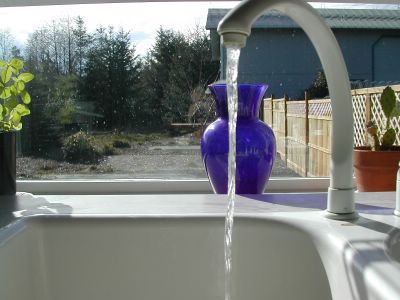

The dread pirate just did a post on watersheds. Have you ever considered where your water comes from? How it is treated? Who owns the rights to it? Do you take your water for granted, even if it stinks like chlorine when it flows out of your tap? Do you think it will always be there, and some public sector employee will make sure of it? Who decides how much you should pay for your water? After all, it's water. It's not like you can live without it. What do you know about the water you drink, and the earth's supply of it? Here's a little background on the status of the earth's water.
"The earth's fresh water is finite and small, representing less than one half of 1 percent of the world's total water stock. Not only are we adding 85 million new people to the planet every year, but our per capita use of water is doubling every twenty years, at more than twice the rate of human population growth. A legacy of factory farming, flood irrigation, the construction of massive dams, toxic dumping, wetlands and forest destruction, and urban and industrial pollution has damaged the Earth's surface water so badly that we are now mining the underground water reserves far faster than nature can replenish them." (Maude Barlow and Tony Clarke. The Nation, "Who Owns Water," September 2, 2002 issue)
-About 70 per cent of all available freshwater is used for agriculture. Yet because of inefficient irrigation systems, particularly in developing countries, 60 per cent of this water is lost to evaporation or is returned to rivers and groundwater aquifers.
-Water withdrawals for irrigation have increased by over 60 per cent since 1960.
-About 40 per cent of the world's population currently lives in areas with moderate-to-high water stress. By 2025, it is estimated that about two thirds of the world's population -- about 5.5 billion people -- will live in areas facing such water stress.
-More and more of the world is facing water shortages, particularly in North Africa and Western and South Asia.
-Water use increased six-fold during the last century, more than twice the rate of population growth.
-Water losses due to leakage, illegal water hook-ups and waste total about 50 per cent of the amount of water used for drinking in developing countries.
- About 90 per cent of sewage and 70 per cent of industrial wastes in developing countries are discharged without treatment, often polluting the usable water supply.
-Freshwater ecosystems have been severely degraded: about half the world's wetlands have been lost and more than 20 per cent of the world's 10,000 known freshwater species are extinct.
-In areas such as the United States, China and India, groundwater is being consumed faster than it is being replenished, and groundwater tables are steadily falling. Some rivers, such as the Colorado River in the western United States and the Yellow River in China, often run dry before they reach the sea.
-The task of carrying water in many rural areas falls to women and children, who often must walk miles each day to get water for their family. Women and girls also tend to suffer the most as a result of the lack of sanitation facilities.
-At any one time, half of the world's hospital beds are occupied by patients suffering from water-borne diseases.
-During the 1990s, about 835 million people in developing countries gained access to safe drinking water, and about 784 million gained access to sanitation facilities.
While there is agreement on the urgent need to improve water management, there are policy differences regarding how best to do this. Some contend that access to clean drinking water and sanitation is a human right for which governments are obligated to provide services. Others maintain that water is an economic good that should be provided in the most cost-effective way, including market driven schemes and privatization of certain components of water delivery as options. Many governments have pursued a hybrid approach. (United Nations Department of Public Information DPI/2293B-December 2002)
One of the reasons the Dharma Bums moved to the Pacific Northwest was in consideration of the looming water crisis. Interestingly, we've just seen our first winter in Washington, and it was unseasonably dry. The state has already been designated in a drought. Here's something to ponder: What does Paul Wolfowitz and the World Bank have to do with water? We're going to try answer that in our next water post, but here's a hint: "Water promises to be to the 21st century what oil was to the 20th century: the precious commodity that determines the wealth of nations."
No comments:
Post a Comment